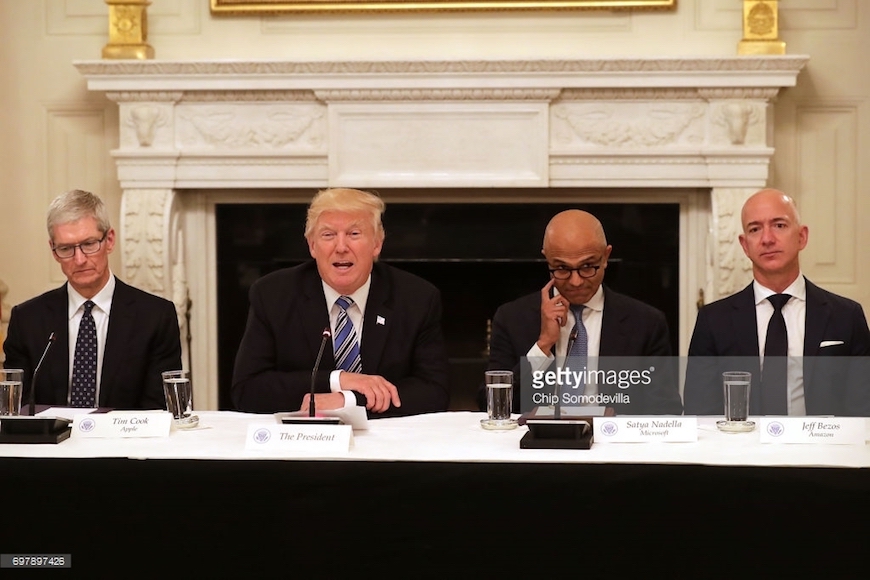The verdict is clear and out in the open: If US tech companies are restrained from recruiting highly skilled workers from other countries, then their companies would not be able to innovate.
On Monday (June 19), US President Donald Trump met a select group of heads of US technology companies. This is the second such meeting of technology leaders and it was convened by the American Technology Council. The President is the Chairman of this Council. Seated immediately next to the President were Satya Nadella (CEO, Microsoft) and Timothy D. Cook (CEO, Apple). In attendance at that meeting were: Jeff Bezos, CEO, Amazon and Tom Leighton, CEO, Akamai, among others. Those absent from this meeting were: Uber CEO Travis Kalanick; Tesla and SpaceX CEO Elon Musk; and Facebook CEO Mark Zuckerberg. The broad objective of the meeting was to discuss actionable ways to digitally transform the American public sector.
Addressing this elite group of technology captains, Trump said. “Our goal is to lead a sweeping transformation of the federal government’s technology that will deliver dramatically better services for citizens, stronger protection from cyberattacks — which we were just discussing in the Oval Office with a little bit smaller group. That’s a big problem, there’s no question about it. We’re going to be working on it and we’re going to solve the problem — and up to a trillion dollars in savings for taxpayers over the next 10 years. Over a trillion.”
Trump added that his administration has taken “very historic steps” to modernize critical IT systems and make government more transparent.
The administration has been spending billions of dollars on IT infrastructure to “get systems fixed” as Trump puts it. That money does not seem to be well spent as critical IT systems continue to be flawed. One example is the IT infrastructure at US airports.
The US Government spends $80 billion on Information Technology, yet it struggles with innovation.
Analysis
We think that the billion dollar investments on cutting edge technology like IoT, artificial intelligence, operational intelligence, and cloud computing (and all the fancy hardware and smart software) is not going to solve problems in the US. This really is about People, Process and then, Technology.
What the administration needs to do is take a close look at all its processes and re-engineer those, on the back of innovation.
The other important thing is People and Skills. Despite all the automation that is happening right now, you are still going to need smart people. But where do they come from? Take a look at the top leadership at the Fortune 100 companies. What is the original nationality of those leaders? Microsoft, Google, Adobe, Pepsi are all headed by Indian-born nationals. There is also talent from other nations. The point is, most of that talent seems to be coming from outside the US.
If the US is going to block the entry of such talent by curbing visas, it will face a dire shortage of skilled professionals to lead its bluechip technology companies. If you open the history books, you will see that this is not a new story. The brilliant minds behind some of the greatest American inventions were immigrants, who came from outside (Jews, Polish, Hungarians, Chinese, Indians etc). What if the US had imposed visa restrictions during the two world wars or during the space race in the 1960s? Would they have superior technology to win their wars? Would their rockets have taken off? Look at the original nationalities of the top scientists at NASA today. Many of them are immigrants.
Technology leaders like Bill Gates, Mark Zuckerberg, and Sunder Pichai have voiced their criticism about Trump’s controversial immigration order against people from seven Muslim-majority countries. Google’s Pichai said it will create “barriers” to bringing great talent to the US.
The verdict is clear and out in the open: If US tech companies are restrained from recruiting highly skilled workers from other countries, then their companies would not be able to innovate. And America would lose its technology prowess to countries like Canada — who welcome skilled workers.
Is Trump and his administration listening?









